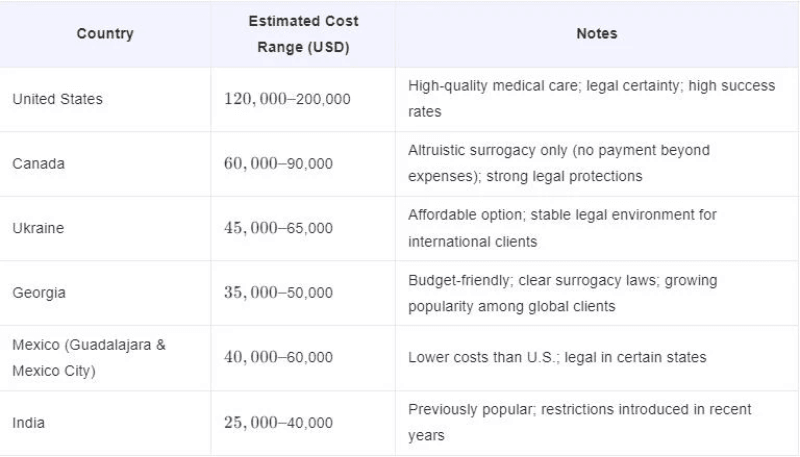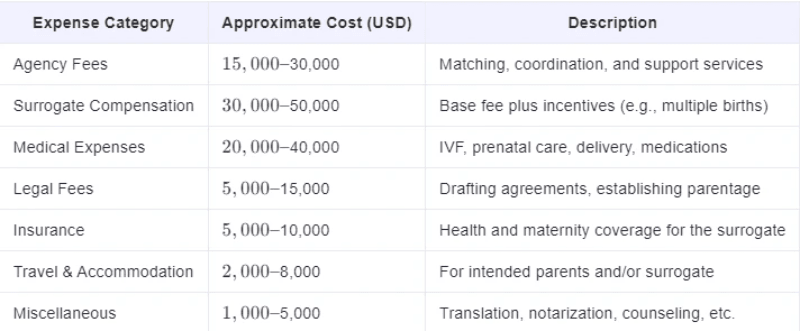Introduction
Surrogacy has become a widely accepted and increasingly common path to parenthood for individuals and couples who are unable to conceive or carry a pregnancy themselves. As medical technology advances and legal frameworks evolve, more people around the world are exploring surrogacy as a viable option. However, one of the most pressing questions that arise when considering surrogacy is: how much does it cost?

What Is Surrogate Motherhood?
Before diving into the financial aspects, let’s clarify what surrogacy entails.
There are two main types of surrogacy:
- Traditional Surrogacy: The surrogate (also known as the birth mother) uses her own egg to conceive, making her the biological mother of the child. This method is less common today due to the complex legal and emotional implications.
- Gestational Surrogacy: The embryo is created using in vitro fertilization (IVF), combining the egg and sperm from either the intended parents or donors. The embryo is then transferred to the surrogate’s uterus. In this case, the surrogate has no genetic link to the baby.
Gestational surrogacy is now the preferred method and is legally supported in many countries.

Factors That Influence Surrogate Mother Cost
The cost of surrogacy can vary dramatically depending on several key factors:
1. Geographic Location
Where the surrogacy takes place plays a major role in determining the overall cost. Countries like the United States, Canada, and the UK tend to be more expensive, while places such as Ukraine, Georgia, and some states in Mexico offer more affordable options — though with varying legal protections.
2. Legal Frameworks
Countries with well-established legal systems for surrogacy often come with higher costs but also greater security and clarity for intended parents.
3. Medical Procedures
The type and number of IVF cycles required, embryo transfers, and any additional fertility treatments can significantly impact the final cost.
4. Agency Fees
Using a surrogacy agency can streamline the process but comes at an added cost. Agencies help match intended parents with surrogates, coordinate medical procedures, and provide legal and psychological support.
5. Compensation for the Surrogate
This includes base compensation, monthly allowances, and reimbursements for medical and travel expenses. Compensation varies widely by region and whether the surrogate is first-time or experienced.
6. Insurance and Legal Fees
Health insurance coverage for the surrogate and legal contracts are essential components of the surrogacy journey and contribute to the total cost.
7. Additional Services
These may include psychological evaluations, escrow services, travel arrangements, and post-birth parental rights establishment.
Average Surrogate Mother Cost Around the World (2025)
Let’s take a look at the average costs of gestational surrogacy across various countries in 2025:

💡 Note: These figures are approximate and based on current market trends. Prices may vary depending on individual circumstances and clinic policies.
Breakdown of Surrogate Mother Cost Components
To better understand where your money goes, here’s a typical breakdown of surrogacy expenses:

Total estimated cost ranges from 78,000toover 158,000.excluding optional add-ons like donor eggs or genetic screening.
Surrogate Mother Cost in the United States: A Deeper Dive
The U.S. remains one of the most popular destinations for surrogacy due to its advanced medical infrastructure and robust legal system. Here’s a closer look at how costs break down in the U.S.:
- Surrogate Compensation: First-time surrogates typically receive $30,000–45,000. Experienced surrogates may earn up to $60,000.
- Agency Fees: Reputable agencies charge between $15,000 and $30,000.
- IVF and Embryo Transfer: Between $15,000 and $30,000 per cycle.
- Legal Fees: Vary by state but usually fall within $8,000–15,000.
- Insurance: Approximately $8,000–12,000 for comprehensive coverage.
- Miscellaneous Expenses: Includes compensation for lost wages, maternity clothes, and other incidentals — roughly $3,000–7,000.
Many intended parents choose to work with full-service agencies that handle every aspect of the process, which helps reduce stress but increases overall cost.

How to Reduce Surrogate Mother Cost Without Compromising Safety
While surrogacy is inherently expensive, there are ways to manage costs effectively:
1. Choose Your Location Wisely
Consider traveling abroad if legal and ethical standards align with your values. Ukraine and Georgia have emerged as top choices for international clients seeking affordability and transparency.
2. Work Directly With Independent Professionals
Some intended parents opt to bypass agencies and work directly with lawyers, clinics, and surrogates. While this can save money, it requires extensive research and careful vetting.
3. Use Frozen Embryos
Fresh IVF cycles are more expensive than using previously frozen embryos. If you already have embryos stored, this can reduce costs significantly.
4. Utilize Fertility Grants and Loans
Organizations such as Resolve.org and Family Equality Council offer grants, scholarships, and low-interest loans to help offset surrogacy costs.
5. Plan Ahead
Starting early allows time to save, research options, and avoid rushed decisions that might lead to higher expenses.
Ethical Considerations and Transparency
When evaluating surrogate mother cost, it’s important to prioritize ethical practices and transparency. Low-cost surrogacy packages may cut corners on surrogate health, legal protections, or emotional support. Always ensure that surrogates are fairly compensated, medically cared for, and fully informed throughout the process.
Transparency in pricing and service delivery builds trust and ensures a smoother journey for everyone involved.
Frequently Asked Questions About Surrogate Mother Cost
Q: Is surrogacy tax-deductible?
A: In some cases, surrogacy-related expenses may be partially deductible. Consult a tax professional familiar with reproductive law in your country.
Q: Can I use insurance to cover surrogacy costs?
A: Most standard insurance plans do not cover surrogacy. Specialized policies for surrogates are available through third-party providers.
Q: Are there hidden fees in surrogacy?
A: Reputable agencies and clinics should provide detailed cost breakdowns upfront. Always ask for itemized quotes and contract reviews before proceeding.
Q: What happens if the surrogate needs a C-section or experiences complications?
A: Medical emergencies are covered under the surrogate’s maternity insurance policy, included in the initial budget.

Conclusion
Understanding the surrogate mother cost is crucial for anyone considering this life-changing path to parenthood. While the financial investment is significant, the rewards of building a family through surrogacy are immeasurable. By researching thoroughly, choosing ethical partners, and planning carefully, intended parents can navigate the surrogacy journey confidently and affordably.
Whether you're just beginning to explore your options or are ready to move forward, being informed about the costs involved will empower you to make the best decisions for your unique situation.
